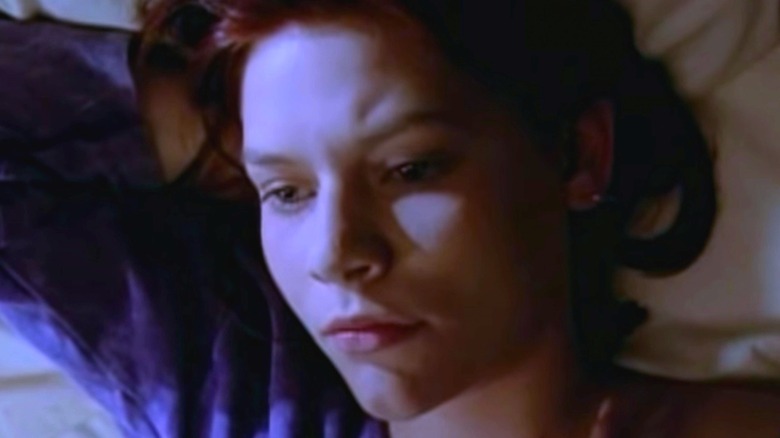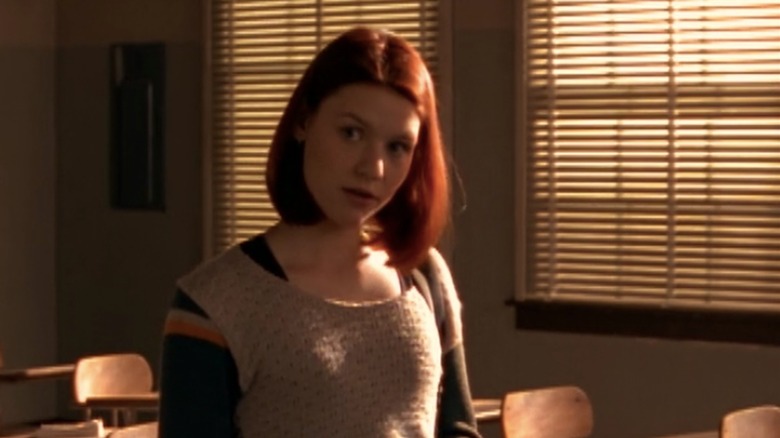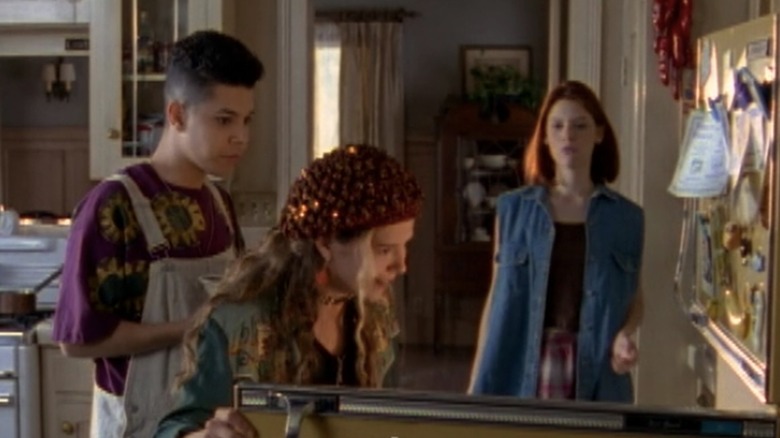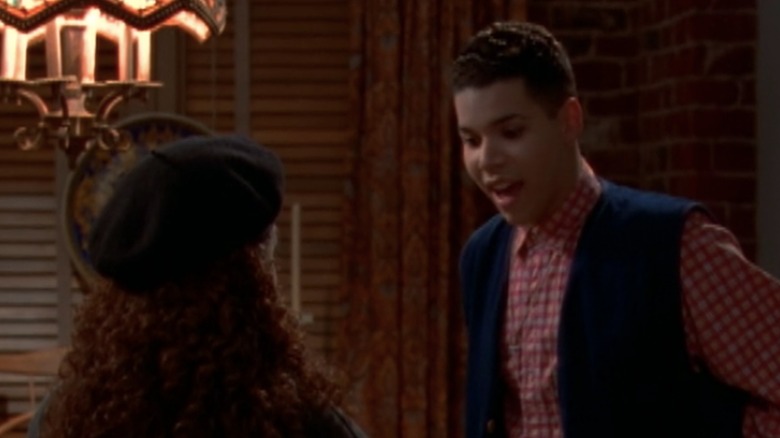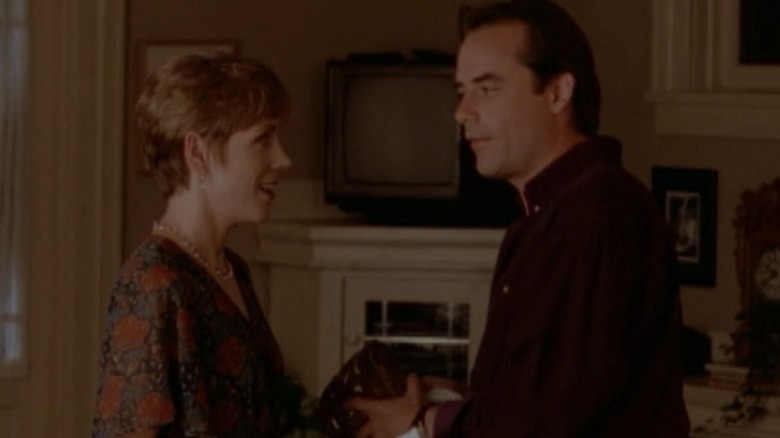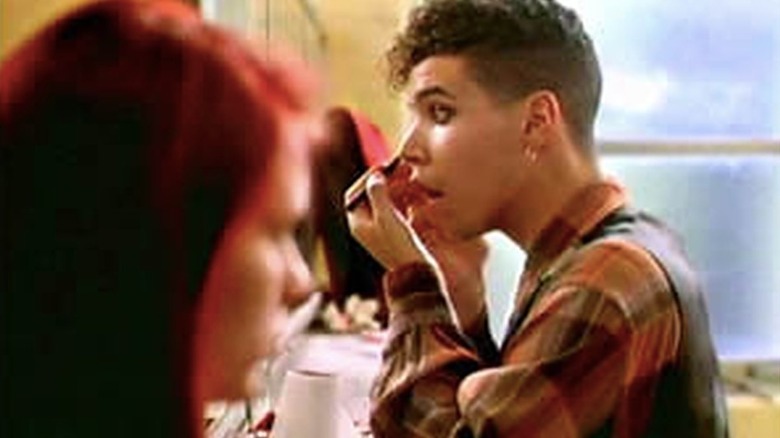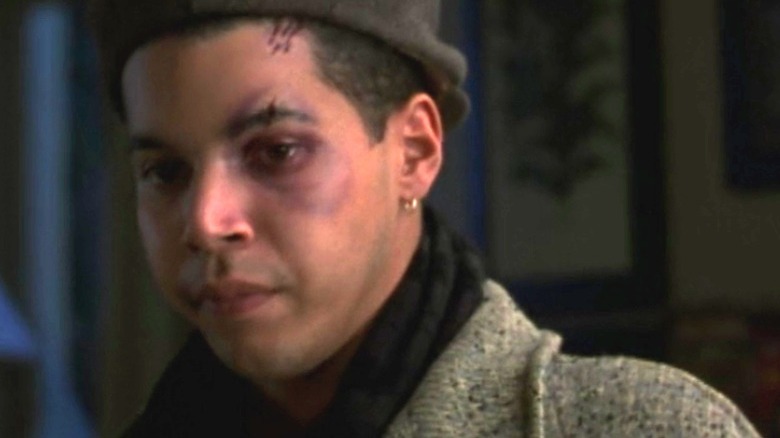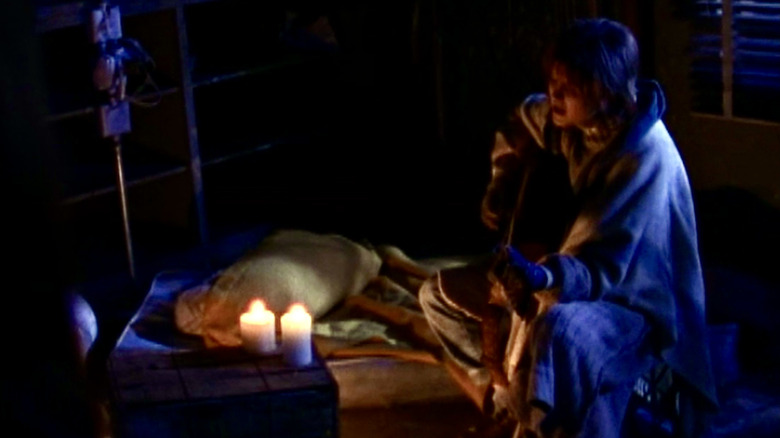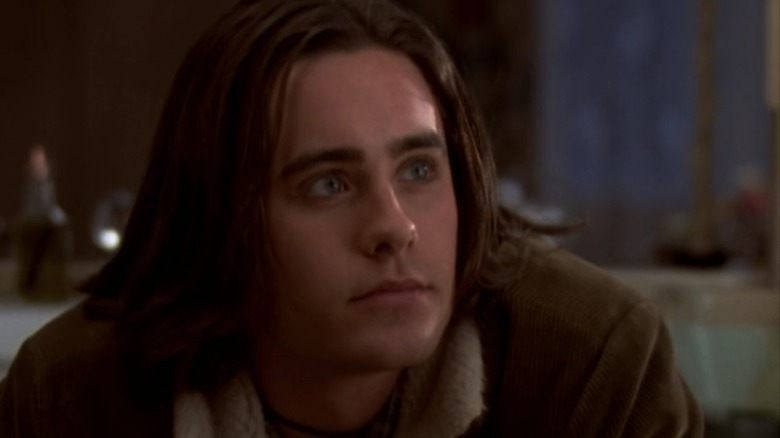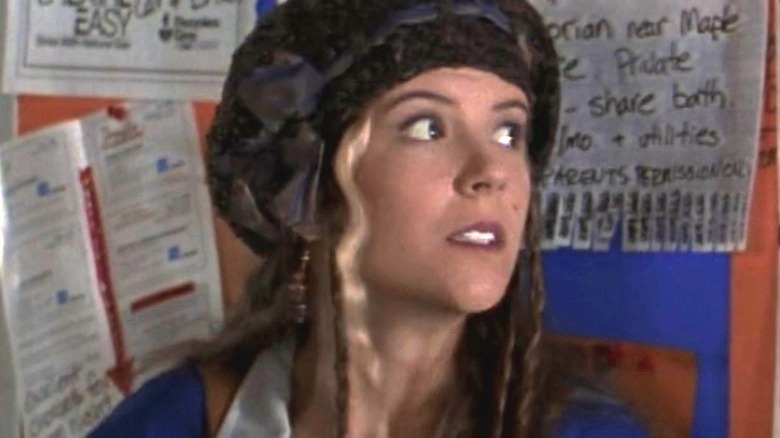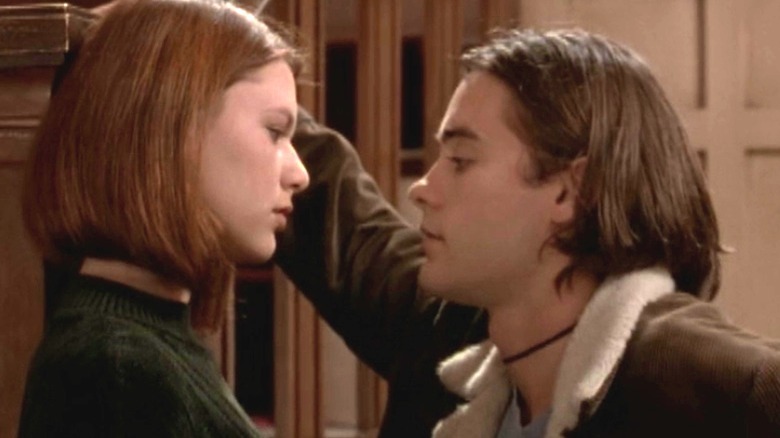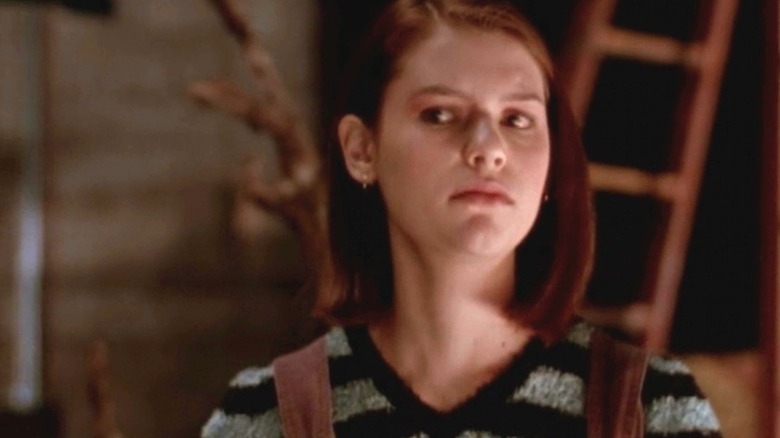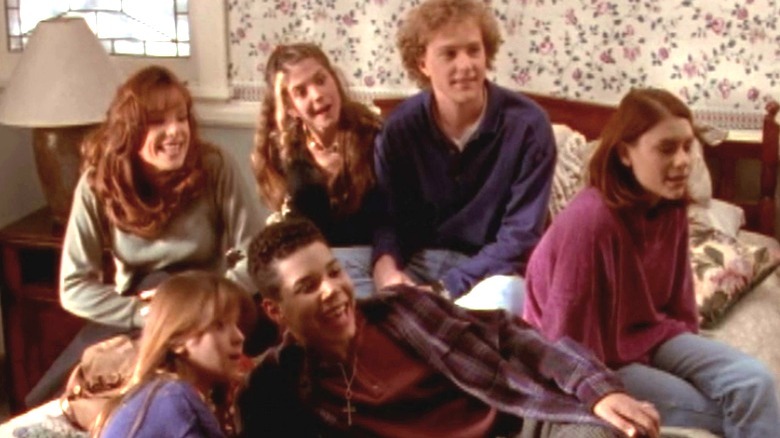My So-Called Life Changed Teen Dramas Forever And You Barely Noticed
Way back in the '94-'95 school year, "My So-Called Life" aired on ABC for only 19 episodes, quietly changing teen dramas forever. How did this series about an introspective teenage girl trying to find her place in the world change teen television? Well, it finally gave viewers a dose of reality. For many teens and young adults in the mid-'90s, "My So-Called Life" was the first time they saw anything resembling their reality on television. Many teen dramas and family sitcoms from that era were formulaic and set in expensive locations like Beverly Hills; the storylines were sanitized, and the characters didn't share the struggles of working-class families with "Roseanne" being an obvious exception.
It's been over 25 years since this series changed teen dramas. "My So-Called Life" began streaming on Hulu in 2021, giving many of us a chance to re-watch the series as adults and giving a new generation of teenagers a chance to love a show that defined a micro generation, Generation Catalano. Joss Whedon, "Buffy the Vampire Slayer" creator, told Yahoo!, "I don't think teen TV really existed until 'My So-Called Life.'"
Decades later, we can fully appreciate how groundbreaking this series was, paving the road for teen shows in the 2000s. Although the series was canceled because of low ratings, it might be safe to say it paid this price for being ahead of its time. Like so many pioneers, this series pushed boundaries, reimagining what teen entertainment could be.
Angela Chase as protagonist
In 1994, even the basic element of having an average 15-year-old girl, Angela Chase, as the main character of a network television show was groundbreaking. As show creator Winnie Holzman told The Guardian, "We all felt it was time for a teenage girl to be front and center." If you looked like a normal girl-next-door, sometimes pretty but often awkward, they cast you in a supporting role, not as a lead, as Claire Danes was at 14 in "My So-Called Life." There are practical reasons minors are rarely cast in "teen" roles; labor laws require onset tutors, limited work hours, and more breaks. But having a teen girl play Angela Chase gave the role authenticity and thoughtfulness we hadn't seen elsewhere on television. "People say you should be yourself, like yourself is this definite thing," Angela said in a voiceover during the trailer, echoing teens everywhere.
The story was told from Angela's perspective, with voiceovers giving viewers an intimacy with Angela. We had only seen this kind of storytelling with "The Wonder Years" and Kevin Arnold's nostalgic look back on his formative years. But Angela wasn't looking back through the lens of wisdom — she was in the thick of it as a sophomore at Liberty High School in the suburbs of Pittsburgh. Angela was intelligent and introspective, contemplating who she was, pulling away from childhood friends, and making new friends while trying to figure out where she fits in the stratified social construct of high school. Co-producer Marshall Herskovitz said, "Trying to do a television show from inside of a person's experience was a pretty new thing" (via The Guardian). Without Angela Chase, we might have never met George Lass in 2003 on "Dead Like Me."
Exploration of socioeconomic class
"My So-Called Life" explored the divide between teens' life experiences based on class when Angela made friends outside of her safe suburban neighborhood. Angela's new friends, Rayanne Graff, Rickie Vasquez, and Jordan Catalano, came from families that differed greatly from her own upper-middle-class, two-parent household. Rayanne was being raised by a single mother, lived in an apartment, and was impressed by the Chase family's abundant food in their refrigerator. At points, Rayanne envied Angela's stable home, despite her sarcastic attitude. Rickie was being raised by his aunt and uncle. Although we never met his family, we know Rickie was afraid of his uncle and that his family moved, abandoning Rickie, suggesting they didn't own their home. Although Jordan has a cool car, what the car represents to him — safety and freedom — differs from what a car might mean to a wealthy teenager.
At one point, while talking to Jordan, Angela fixates on his shirt, "like he was from a poor family and couldn't afford new shirts. It was all I could see. The whole world was that unraveled piece of fabric." This series differed from many teen shows of its era because it addressed these class differences without having a special episode dedicated to exploring these themes. We learn about the characters' home lives as the teens become more involved in each other's lives, much like we would learn these details in real-life. Angela's privileged existence and perspective are revealed through her subtle reactions to her new friend's challenges. As discussed in The Guardian, these experiences force her to acknowledge her privilege, recognizing how lucky she is despite her abundant teen angst.
Representation of queer teens
Through the character of Rickie Vasquez, the series explored queer identity as Rickie contemplates his sexual orientation. Winnie Holzman told The Guardian, "I wanted Rickie to be – well, ultimately he identifies as gay, but initially I wanted him to be sexually androgynous – not so easily categorized." Rickie Vasquez was the first openly gay character on network television, and Wilson Cruz, an openly gay actor, played him. How groundbreaking this storyline and character from "My So-Called Life" was can't be overstated. Recently, Wilson Cruz reflected on his pioneering role, telling Today, "I have great pride in being that person ... his very existence of being on a national television show about teenagers, that people like him felt seen, and included and were a part of the story."
Rickie and the storylines the series explored through this character pushed the boundaries of what we had seen on television. This representation was unique on television in the '90s and important for queer teens who hadn't seen themselves in a character on TV before. The effect characters like Rickie can have on people's lives can't be overstated. Cruz even credits the story with reconciling with his father after being estranged. Cruz revealed to People, "It was through his watching of the series that he was able to understand what my life was really like." "My So-Called Life" didn't just shape the future of television — it actually changed some people's lives.
Gender norms
Through the Chase household, "My-So Called Life" explored how traditional gender norms had shifted in American families. The Guardian argues this was Holzman's intention when she "gave Angela parents (Patty, the breadwinner, Graham, the homebody) who were still themselves in the midst of establishing their identities and discovering their incompatibility with traditional domestic tropes." Their roles within the family structure had become reversed from what we had typically seen in nuclear families on television. Part of what was so groundbreaking about this dynamic being shown on television is that it wasn't a significant source of tension between Patty and Graham.
Graham was more troubled by not doing what he loved than his wife being his boss. Patty's more assertive nature did not threaten Graham's masculinity. He was fine with her being the disciplinarian parent. Graham seemed comfortable being the partner who made sure the household kept running. "My So-Called Life" didn't perpetuate an outdated 1950s nuclear family structure. It showed a home where both parents worked, and both parents contributed to making the household run, even when they had relationship troubles. The series also showed that a two-parent household was becoming a thing of the past.
Gender identity
Long before being gender-fluid became a mainstream concept, Rickie Vasquez was wearing eyeliner, dressing with colorful flair, and hanging out in the girls' bathroom at Liberty High School in "My So-Called Life." The series explored gender identity through Rickie and his androgynous fashion sense, as well as his feelings of isolation. At one point in the series, Rickie says, "I belong nowhere, with no one. I don't fit." Although Rickie has crushes on boys and his own uniquely effeminate style, he ultimately acknowledges he enjoys hanging out with girls because he feels more comfortable around women, but he doesn't want to be a girl.
Show creator Winnie Holzman shared with The Guardian that the 1990 documentary "Paris Is Burning" exploring the drag ball scene in New York inspired Rickie's character. Class, race, sexuality, and gender marginalized the people from the House of Xtravaganza, a Latinx group in the documentary. They were vibrant beauties that defied categorization, just like Rickie. In an interview with Today, Cruz said of Rickie, "I understood that this was somebody who lived in the in-between worlds, like he wasn't fully Black, he wasn't fully Puerto Rican, he considered himself bisexual," Rickie inhabited that liminal space between definitions, giving audience members who didn't have a clear gender identity permission to explore who they were.
Domestic abuse
Although Angela Chase was the main character and the glue that held her social spheres together, many of the powerful storylines came from her friends and their life experiences. The Christmas episode of "My So-Called Life" was an intense and heartbreaking exploration of child abuse through the characters of Rickie Vasquez and Jordan Catalano. Right before winter break, Rickie comes to school with a black eye, claiming he fell, slipping on ice. Angela suspects he is lying. Rayanne tells Angela that Rickie "Has a habit of getting beat up," suggesting this isn't the first time. Later in the episode, Jordan sees Rickey hanging around outside in the cold, and Jordan offers to give Rickey a ride.
As Jordan tells Rickey, he knows of a place where Rickey can hide out, confessing, "my old-man used to knock me around too." The episode helps us understand why Rickey was afraid of his uncle. We also come to realize that despite Jordan's good looks, popularity, and cool car, he has a troubled home-life, perhaps explaining his quiet, almost reserved nature. Episode 15 is upsetting and real, exploring the subject of child abuse, something we hadn't really seen on television before. "My So-Called Life" gave other shows permission to push the boundaries of topics we can explore on teen television. Nahnatchka Khan of ABC's "Fresh Off The Boat" told Yahoo! "the whole storyline with Rickie (played by Wilson Cruz) just trying to be his true self in the face of hate and adversity was revolutionary."
If you or someone you know is dealing with domestic abuse, you can call the National Domestic Violence Hotline at 1−800−799−7233. You can also find more information, resources, and support at their website.
Teen homelessness
The Christmas episode titled "So-Called Angels" also explored teen homelessness through the character of Rickie Vasquez and a homeless teenage girl (who is actually a ghost) Angela meets. When Rickie was beaten up by his uncle, he was also kicked out of the family home. Although it is never explicitly said, they imply Rickie's uncle may have kicked him out because of his sexual orientation. According to the National Network for Youth, "Research has shown that those who identify as lesbian, gay, bisexual, transgender, or questioning (LGBTQ+) have a 120% higher risk of experiencing some form of homelessness." This series addressing homeless youth and the role sexual orientation can play was groundbreaking. The fact the series continued to explore Rickey's homelessness in following episodes only made the series' contribution to bringing this subject into public discourse more impressive.
It is clear Patty and Graham Chase are uncomfortable helping Rickie, saying, "It's not our place." But Graham has the courage to point out Patty's discomfort with Rickie, saying she wouldn't think twice about helping Brian Krakow if he were in a similar situation. Although it is clear the Chases aren't bad people, we see that their prejudice clouds their judgment. Realizing he wasn't welcome, Rickie goes back to the abandoned warehouse Jordan had shown him. When Angela goes looking for Rickie, seeing the homeless teenagers, Angela realizes given different life circumstances, their roles could be reversed. Angela argues with her parents, telling them that those kids are just like her. This episode forces the Chase family to recognize their privilege. Hopefully, it had a similar impact on audiences at home.
Learning disabilities
Other shows have done it before. "The Cosby Show" had its "dyslexia" episode, where we learned why Theo was having trouble in school; but like most episodes dedicated to social issues in network television in the '80s and '90s, it was a one and done; now that we've addressed the problem, it is magically fixed. "My So-Called Life" explored learning disabilities through the character of Jordan Catalano in Episode 6, "The Substitute," and Episode 7, "Why Jordan Can't Read," in a more realistic and nuanced manner. In these episodes, a substitute teacher and Angela both realize Jordan can barely read.
Although Jordan is never diagnosed with dyslexia, the series explores how some students slip through the cracks, not getting the help they need at home or in school. According to the US Department of Education and the National Institute of Literacy, 19% of high school graduates can't read. In "My So-Called Life," Jordan's reading challenges aren't fixed by wealthy parents paying for a tutor. Angela signs Jordan up for a peer tutor. It is yet another example of how this series explored narratives with a fresh approach, injecting the storylines with a dose of reality, never tying it up in a neat bow, but revisiting these themes over multiple episodes. "Why Jordan Can't Read" also showed teen viewers the power of vulnerability. When Angela learns Jordan's secret, she doesn't recoil from him. It actually brought them closer together, finally becoming a couple.
Substance abuse
Although many network family sitcoms and teen dramas had their substance abuse episode, it was typically a one-and-done approach. In "My So-Called Life," the intricacies of teen substance abuse were explored through the character of Rayanne Graff, Angela's new best friend. "I knew I wanted Rayanne to be wild and to lead Angela into challenging new situations," Winnie Holzman told The Guardian. Angela is drawn to Rayanne's brash attitude and spontaneous nature because Rayanne represents qualities Angela wishes she had. In Episode 10, titled "Other People's Mothers," Rayanne has a birthday party while her mother is out. When Rayanne drinks too much, mixing alcohol with ecstasy, becoming unresponsive, Angela calls her mom Patty, and they rush Rayanne to the hospital.
Although Rayanne goes to required counseling and quits drinking, it isn't over. She does relapse. The series explores the impact substance abuse has on relationships. Rickie becomes anxious, worried Rayanne will relapse, while Angela pulls away, establishing an emotional distance. Rayanne realistically portrays how substance abuse is an ongoing issue that isn't magically fixed because they finally acknowledged the problem. We come to realize Rayanne covers up her insecurities with a mask of indifference and that she is a more nuanced character than we had assumed. "My So-Called Life" approaches teen drug use with a realism we hadn't seen on TV before this groundbreaking series. Stephanie Savage of "Marvel's Runaways" told Yahoo!, "the rawness and intensity of the mother-daughter relationship at that age — they captured it perfectly" in the episode "Other People's Mothers."
If you or anyone you know is struggling with addiction issues, help is available. Visit the Substance Abuse and Mental Health Services Administration website or contact SAMHSA's National Helpline at 1-800-662-HELP (4357).
Teen's sex lives
The reality is more teens were having sex in the '90s than they are now, according to a recent study, but you weren't seeing this reflected on television in the '90s. Michael Mohan, show creator of Netflix's "Everything Sucks," told Yahoo! "When the pilot episode of 'My So-Called Life' first aired back in 1994, it felt so unbelievably fresh. Up until then, teenage life had only been depicted via overly sanitized sitcoms like 'Blossom' or 'Saved by the Bell.'" This series explored the sex lives of teens with a frankness other teen dramas of the era did not. According to The Guardian, "by 1996 only 12% of shows involved adolescent sexual content."
Through Rayanne, Sharon, and Angela, we saw varying degrees of sexual activity amongst teenage girls, and we did not demonize them. They talked about sex. Sharon had a frank conversation with Angela about sleeping with her ex-boyfriend and feeling guilty about it, wondering what it said about her as a person. In Episode 13, Jordan pressures Angela to have sex, and Graham overhears Angela telling Jordan she isn't ready to sleep with him despite her desire. In the series, Angela says, "There's a dividing line between girls who have sex, and girls who haven't." This ABC series didn't shy away from awkward conversations and emotions. "My So-Called Life" lived in that space, just like the teenagers who watched it.
Infidelity
Although Angela and her friends are often the focus of the plot of the series, Angela's family is a big part of the series too. The way Angela's parents are incorporated into the show made it appealing to parents and teens alike. While Angela benefits from having a stable home life and her parent's relationship is functional, it is far from perfect. At the beginning of the series, Angela sees her dad, Graham, talking to and flirting with a younger woman. Later we learn he was contemplating having an affair but broke it off, recommitting to his family. The looming possibility of divorce hangs in the ether in the Chase household. The show addressed how the romantic relationship between parents can take a backseat, getting lost to the realities of raising children. Patty and Graham are drifting apart, and the specter of infidelity looms.
"My So-Called Life" also addressed cheating when Rayanne sleeps with Jordan in Episode 17, titled "Betrayal." The mistake destroys the girls' already struggling friendship, teaching them both a painful lesson about betrayal. But Rayanne is not demonized in this series. It is a very realistic portrait of betrayal and regret, showing how upset Rayanne, Angela, and Jordan are. Michael Mohan of "Everything Sucks!" told Yahoo! "This is a show that wasn't afraid to be quiet. It wasn't afraid to have the characters do unlikable things. It was just honest and messy, and above all real."
Family dynamics
The series addressed family dynamics in a fresh and realistic manner through the tension between Angela and Patty Chase. But we also see an honest representation of sibling dynamics between Angela and her little sister Dannielle. Danielle lurks, wanting to hang out with her older sister, but Angela is annoyed with Danielle. Episode 18, "Weekend," is told through Danielle's perspective through voiceovers. We see Danielle's yearning to be a part of her older sister's life and how left out she feels. This is a theme we see in multiple episodes in the series. Danielle feels like the focus in the family is on Angela. In Episode 9, "Halloween," Danielle even dresses up as her sister, complete with a wig and a spot-on imitation of Angela's body language and speech patterns.
In Episode 5, "The Zit," Angela struggles with her appearance, feeling unattractive and embarrassed that she isn't developing physically in the ways her childhood best friend Sharon is. Patty's desire to do a charity fashion show together exacerbates Angela's discomfort and insecurity about her appearance. Angela explains how uncomfortable it is to be compared to her mother, who was pretty and popular in high school. Throughout the episode, it is painfully obvious Dannielle wants to join her mom, feeling left out of the activity Angela is desperate to avoid. The complexity and reality of these points of friction between mom and daughter are raw and real, unlike anything we had seen on TV before "My So-Called Life."
Teen social cliques
One thing "My So-Called Life" excelled at was giving a voice to the alternative teens — those who didn't fit into the easily categorized social structure of high school with basic representations like jock, nerd, band-geek, or drama-freak. Angela is smart but not an ambitious student. She exists on the fringes of her high school; she isn't on a team and quits Yearbook in the first episode. Sharon is in band, a dedicated student, and signs up for extra-circulars, but she isn't a one-sided character lacking sex appeal. While Brian Krakow is nerdy, he also has a fiery temper and a passionate interest in Angela. Wired said that the series "treated teenagers like people, not just stereotypes of people."
Even Jordan Catalano, the object of Angela's affection, isn't your typical popular jock from '90s sitcoms. He's a musician — a quiet and mysterious boy that seems to have more going on under the surface than what he will verbalize. Katie Elmore Mota of Hulu's "East Los High" told Yahoo! "It wasn't so much that I really connected to one particular storyline, but the series as a whole really resonated with me. I loved that it was about a group of students on the fringe, teens who felt like they didn't belong anywhere and were dealing with the pressures of fitting in."
The fashion and music in the series are a time capsule from the mid-'90s, when being a little different was kind of cool. Rewatching this series, it is abundantly clear that "My So-Called Life" changed teen TV while we weren't watching despite its short run.
